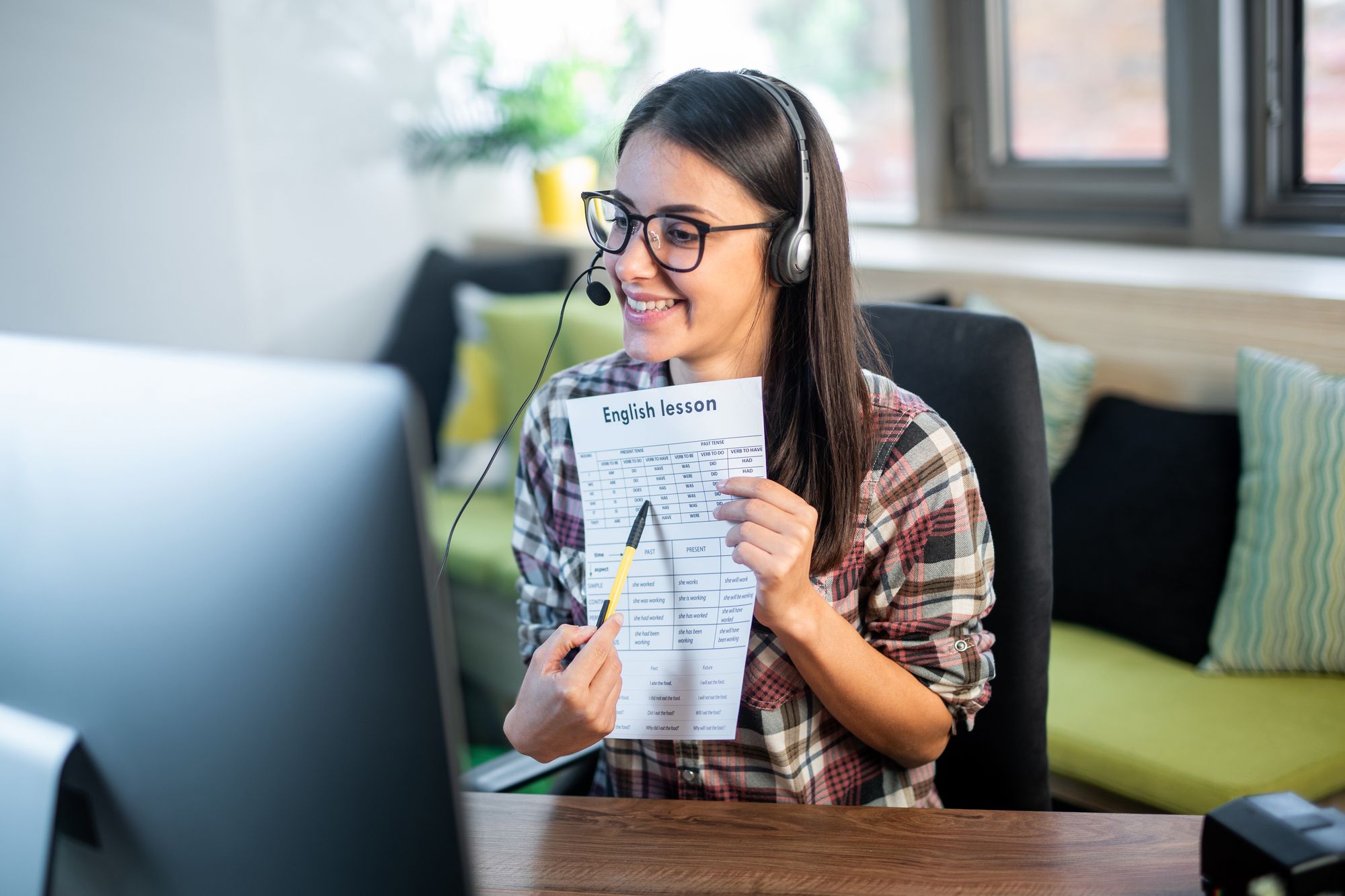1, Turn English captions on
It’s so important not to wait until your English class or your English tutoring session to use English. You need to find ways immerse yourself in English each day, that means you have to consume contents in English.
One simple thing that you can do right now is that while you’re watching YouTube videos, you should turn the captions or subtitles on in English, just click on the settings and turn the CC on. In that way, you can practice English while relax yourself at the same time.
The more inputs, the better. Having subtitles on doesn’t hurt your English. You’re simply able to exercise your reading skills and your listening skills. You might try watching for the first time with the subtitles on and then the second time put the subtitles off and see how much you understand. Or if you want to challenge yourself, you can reverse that and watch the first time with no subtitles. See how much you understand and then watch the video again a second time with the captions on.
2, Listen to a daily podcast
In order to consume English a little bit each day, we highly recommend that you listen to a daily Podcast. If you like to stay up to date on world events, the perfect podcast for you is “The Daily” from The New York Times. It’s about 20 minutes long, which is perfect. It’s not too long or too overwhelming and it will fit perfectly in your routine going to the gym or commuting to work. Or if you walk a dog or need to do some chores at home, 20 minutes is a great length of time. So we recommend starting with “The Daily”. It might be a little bit advanced because it’s meant for native English speakers. So if it is too difficult, don’t give up, just revisit it in a few weeks and see if it’s easier to understand.
A big mistake that a lot of English learners make is that you consume a lot of English materials, which is good. But you stop there just because you can understand what you’re listening to or what you’re reading, and it will not help you become more fluent in English. Fluency means that you’re able to communicate your ideas in English through writing or speaking. So make sure that when you are consuming materials, you’re also writing and speaking. To practice speaking, you could shadow the podcast you’re listening to. To practice writing, you could write some notes on what you listen to,what did you learn, what was interesting or whether there were any new words that you’d like to look up afterwards.
So make sure that you’re not only reading or listening to English, you’re also speaking and writing!
3, Build your vocabulary a little bit each day
Another big mistake that keeps a lot of English learners from fluency is lack of vocabulary. We need to build our vocabulary a little bit each day. So think about how you could add new to your vocabulary. One way that you can do is to look at the word of the day on the Merriam-Webster dictionary website. So, each day, they will give you a new word, which is usually a little advanced and you can write it down and try using it in your journal or in your own sentence.
4, Translating English into your native language
Another mistake that English learners often make is trying to translate everything in your head when you’re speaking. However, to improve your writing skills, you still should translate and actually, it can be a really good exercise for you to try translating from English to your native language. Observe and make note of how the languages express the same ideas sometimes very differently.
If you would like a fun exercise to translate from English to your native language, you can translate videos on Youtube, which will give you so much fun or even economic benefits if you do a good job.
5, Use social media in English
A lot of you might use social media. Maybe you use Facebook or Instagram or Twitter? On social media don’t just be an observer, find accounts to follow or friends who speak English and take time to comments in English on their posts or join a conversation in a group. This is a really important way for you to develop your English skills.
It’s simple it’s easy It’s fast and it is really good for shy learners. If you don’t feel quite ready to speak with native speakers, try using English on social media a little each day.
6, Review
One common mistake is to constantly focus on learning new things. It’s great to learn new vocabulary, expressions, phrases, and grammar; however, it is actually even more important to review what you’ve already learned. It can take 20 times seeing the same word for you to understand and remember the meaning the pronunciation and how to use it in your own sentences actively. So remember to review and be patient with yourself because almost no one, even the native speakers, remember a word after the first time they see it. We need to repeat and review many many times.
7, Imagine yourself as a fluent speaker
This tip might seem a little woowoo, or different but actually, it’s really important for every English learner to envision themselves as a fluent confident English speaker. It’s quite like meditation or visualization or affirmations. Take a minute each day. Close your eyes and imagine yourself in a situation where you’re speaking English fluently, or you’re giving a presentation in English, or maybe you’re at a dinner with friends or coworkers and you’re having a great conversation in English.
See yourself in that situation in your mind because this will help to prepare you to feel familiar; therefore, become more confident when these situations occur in real life. So use the power of your mind to improve your English fluency. In order to create a new reality where you are a fluent confident English speaker, we have to envision it first before it becomes reality.
8, Start a conversation with someone
Don’t wait for someone to start a conversation with you in English. No native English speaker is going to come knocking on your door to start a conversation with you. You need to be the instigator, start a conversation with someone in English today. it could be someone in person if you’re so lucky to live in a place with other native English speakers, or it could be on social media online and it doesn’t have to be with native English speakers. It could be with any English speaker at all.
9, Record yourself speaking or shadowing
Don’t depend on other people to tell you when you’re making mistakes. Each day, you can try speaking English. It could be free speaking if you’re more advanced where you just speak whatever is on your minds, or it could be shadowing another material that you’re listening to, simply copying what you hear and recording yourself. This is so helpful. If you record yourself, you can listen, you can playback your speaking, and notice where you might be making mistakes, or maybe where your pronunciation is a little off. That is the very first step to improving your English skills.
10, Contact support in English
This is another tip for actually using English in real life. Think of a website, a product, a service that you use, where it’s an English-speaking company, and you can actually contact their support. Maybe you have a question about the product, or the service. A lot of websites nowadays have chats for customer service. So you could actually practice your English while you’re asking questions about a product or service you’re interested in, and some businesses still have old-fashioned phone lines so you could go ahead and practice your English for telephone calls by calling a company that’s of interest to you.
11, Listen to music every day in English
You may have probably heard this tip many times before. It is highly recommended that learners listen to music every day in English, and don’t just listen, sing and enjoy yourself, put emotion into the songs. Emotion feelings as well as movement dancing will help you to improve your English because these are all ways that help our body and our mind to remember words in songs. You can pick up new vocabulary. So choose a song that you enjoy, learn the lyrics, sing it, dance it, and enjoy using English.
12, Take a tour in Your City in English
If you live in a city and where there’s tourism, you could look at taking a tour where people would be speaking English with English-speaking tourists. In this way, you will not only be able to practice listening and speaking skills, but you also can have friends coming from all corners all over the world. This will certainly enhance your knowledge about other cultures and traditions.
13, Choose one way to use English and make an appointment with yourself in calendar
Don’t try to do everything. Don’t try to become fluent in English right away. Just break down your goals into smaller steps and choose one small thing each day. In fact, to make certain improvements, you should give yourself a deadline, make an appointment with yourself each day to practice English. This is more of a strategic tip, or a motivational tip to help you with your discipline. You can use this tip to make sure that you don’t forget your tasks or you will never say “Oh, I don’t have time today, maybe tomorrow”. Create the time. Don’t just depend on outside sources for English.
14, Think in English throughout the day
We talked a lot about listening to podcasts or music, writing in your journal, looking up a word of a day, and many other things but you can actually use English in your own mind throughout the day. Try creating sentences.
For example, right now you are eating lunch and then you are going to go to the gym or whatever is happening in your day. You could describe people that you’re seeing “Oh, that woman has a really beautiful dress”. And so you’re actually narrating your day in English.
15, Recap or review your day in English before you go to bed
The next tip that’s related is when you go to bed at night before you sleep, try recapping or summarizing your day in English.
- “I woke up at 6 a.m then I had breakfast, etc.”
This will really help your fluency. Do this each night before bed and you might be surprised that pretty soon, you’ll start dreaming in English.
16, Label objects at home
Our second-to-last tip is that you, at home, can label different objects around your house, so this will help you to improve your vocabulary when you actually put a sticky notes on an item at home and label it with the correct vocabulary. In that way, you’re seeing English everywhere you go.
17, Use English to help others or make their day better
Finally last but not least, perhaps my favorite way to use English each day is to think about how you could use English to help someone or to make someone’s day a little bit better. Could you give someone a compliment? Could you tell them that they look nice today or that they have a nice dress on or their hair looks nice? Could you offer to help someone? May you see someone who’s struggling, who needs help to do something and you can offer to help in English
All right, above are 17 tips for using English on a daily basis to improve your fluency, confidence and speaking skills. We hope you enjoyed the lesson! In order to get further explanation and practice your listening skills also, watch the video below. Thank you for reading and see you in the next writing!



